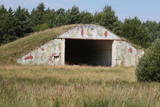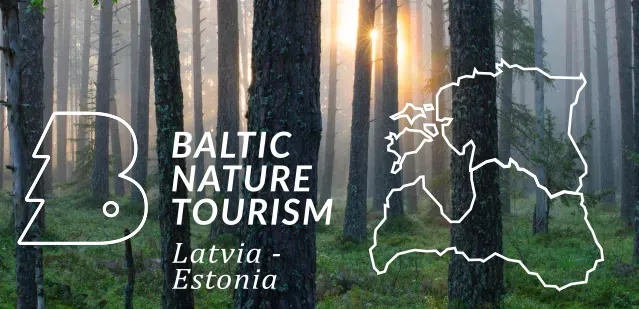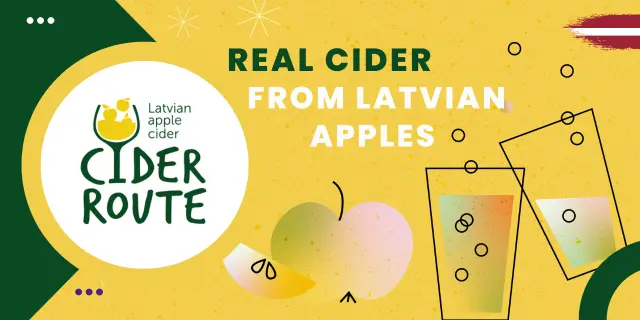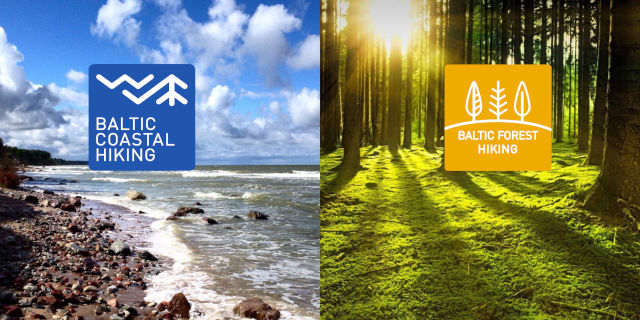Border guards in Ziemupe
In the end of the 60-ies and the beginning of the 70-ies, a construction battalion arrived. They fenced a pitch, brought stones from the fields of the collective farm and started to build the base for “land-to-air” missiles. Usually the local tractor drivers went up to the gates and the soldiers took the loaded vehicles into the territory. Sometimes the engine would stop and a soldier would not know how to cope. Then the local drivers were admitted to the territory to save the situation, nearly blindfolded so that they did not see what happens inside. The <i>strojba</i>t built the base in about 1.5 years. They planted some birch trees. The base was not large, there were three nests, and each held one missile. There was a locator on the top of a dike. They built barracks and two residential homes. There were more officers than soldiers in the missile base as soldiers were only in the service staff. The officers were educated in telecommunications. It was very convenient for the locals. When a radio or TV set went out of order, they just had to give a call to the military and a bottle of wine, and the problem was solved.
We lived in the restricted zone in Ziemupe, my father’s house was about 0,5km from the sea. There was a border guard zastav between the sea and my father’s house. We all had two letters stamped in our passports - “ZZ” (zapretnaja zona, restricted zone). Those who did not have the stamp or did not have one’s passport in the pocket were arrested and had to go with the border guards to their zastav. People could go by public transport from Liepāja to Pāvilosta and from Pāvilosta to Ventspils, but it was not allowed to get off the bus in other places. If somebody wanted to visit, the local people had to write to the local Executive Committee and the Passport Office asking permission for particular persons to visit the territory staying for specified time and based on particular reason.
Right after the war there were many zastavs, close to one another. In the end of the 1960-ies the smaller zastavs were closed, just big ones remained in Šķēde, Pāvilosta and Ventspils. Then the missile unit arrived.
Once, in the middle of the 70-ies my cousin and I ran to the sea for a swim. It was in place where it was not allowed. I noticed a border guard coming along the seashore and said we have to run away. We looked at the beach. There were two men standing with their Kalashnikovs in hand, the barrels down. They took us as we were, naked, wearing only swimming trunks and made us run some 10km along the seashore to the zastav in Šķēde. Then we had to go back home, still wearing just trunks, not along the seashore but by the main road, on gravel. I knew the head of the zastav, Daģis, a Lithuanian. He would offer to take us back in a car but their bobik had broken down. We had sore feet before we got back to places where people lived and could get a lift. They did not make us to peel potatoes.
In Ziemupe, people could swim opposite the graveyard. It was not far, some 100m. But we had to have passports with us. At the Ziemupe rivermouth there was a post with two guards watching. If someone went too far, one of the guards came down, whistled and ordered to come back. The other stayed up on the turret. There was a driveway descending to the sea, the collective farm workers used to come here to take sand and seaweeds. With border guard permission, people could take as much seaweeds as they needed.
In Ziemupe and Šķēde there were spotlight houses. The spotlights were on rail and the border guards shove them out every evening. We had a school excursion to that place. It was an impressive sight. The lamp was like a huge mirror, 3m in diameter. When they switched it on in autumn nights and in winter, all the seashore was illuminated, at times we could not sleep.
The zastav was part of life as we lived nearby. When I was young kid, not in school yet, there was a shooting range behind the zastav, in the side of the sea. We could not sleep at night because there was continuous shooting. Tracer bullets went towards the sea; we could go out and watch. At school, we had to collect scrap metal. I collected some sacks full of cartridge-cases. Everybody wondered where I got them. They did not accept the cartridge-cases for scrap metal. It was impossible to send them to the central collection point. So for a long time I kept them at home.
Once a week they were showing movies in zastav. I was allowed to go and see. I knew the men from all the call-ups at that time. There were some 20 men, an officer and the zampolit (deputy commander for political work). The officers did not live in the zastav. They lived with their families in local peoples’ homes. My grandmother had an officer’s family in her house. In the beginning, she did not want them at all, she said, “Those Russians will move in and would be steeling things”. The first tenants were the commanders who had returned from the war. Later young men came who finished schooling after war, and they were intelligent people. In the beginning, it was difficult for the old people to communicate in Russian. My grandmother had been in school only 2 years, it was when Latvia was under the rule of the Russian Tsar. She did not know how to explain to soldiers that there was no milk. She said, mixing Russian, Latvian and German words „karova kranks, piens niht” (the cow is sick, there is no milk). Many local people new German language well.
I have been wondering about the Russian food ways. How could they live just on canned meat. Say, the evening meal: they would boil jacked potatoes, take some onions and chives from the garden, and then this canned meet. I do not know if they heated it up or had it cold as it was. They peeled potatoes with fingers, grabbed chives and bite the onion eating it like an apple, taking some bits of canned meet.
The border guard had 5 or 6 horses, and they used to ride along the coast. They did not attend the horses well. They tied the horses to poles, but these were not strong and the horses broke loose. The horses ate what they found in my grandmother’s garden and she was complaining to the border guards. They made up sad faces and promised to watch their horses better. Ziemupe people did not have a bad thing to say about the border guards as they were not walking around and steeling things. Still there were some experiences. My grandmother noticed that every time when one of the soldiers was sitting in the vishka, some milk would drain from the milk churn that was dipped in the well for cooling. It was not much, just 2-3 litres, enough exactly to fill a teapot from the military canteen. Until it was happening once a week, my grandmother did not object, but then it repeated every night. Once my grandmother put skimmed milk in the milk churn and added some 2kg of salt. In the morning, the milk was drained again. My grandmother walked down the trail towards zastav, and she found the salted milk poured out on the earth right around the corner by the stables. Since then milk never disappeared again. In summertime, soldiers came to help with hay harvesting. They came in car and helped to fork the hay in. Officers came to buy milk. They were taking their kids to school in Liepāja. Their wives lived in grand style when they got wages (it was good money compared with what the local people could make at the collective farm). Then it was partying with good drinks and food. But after a week, they were buying milk on credit. Sometimes they borrowed money, and they always paid the debt.
My father gave me a photo camera “Smena” on my 10th birthday. I practiced in summer, and when the winter came I decided to do a photography expedition. There was deep snow. I went on skies pass the zastav buildings and the graveyard towards the sea making pictures from time to time. I went into a stand of pines in the dunes, there were beautiful views. Suddenly I felt snow coming down. Three men with guns appeared shouting “Ruki vverh!” (hands up!). They took my camera and took me to zastav. Their commander was in captain’s rank, there were no officers of higher rank here. He had been living at my grandmother’s and he knew me. He said they would develop the film and see what pictures I have made. If there would be nothing of their interest, I would get it back. They cut a couple of pictures out and gave the rest back to me. Then it occurred to me that I could snapshoot whatever I wanted from the hatch in the stables’ roof. It was still when they harrowed the beach and some land above the dune with horse-drawn harrow. That’s why they needed horses.
In the first years, the border guard did not have other animals, just horses and two dogs. There were barbed wire fences and a fine wire attached to the alarm system. If something caught the wire, an alarm signal switched on in zastav.
We had all kinds of events in the countryside: movie sessions with dance parties, open-air dances, sports games. There was no electrical power, and they used an engine to show movies. Soldiers used to come for movies. The locals did not have any problems with border guards. But there was a sea-born infantry unit in Saka, not far from Pāvilosta, some 10-12 men. They did not have a proper officer to command them just some sergeant or praporschik. So they were roaming around and scuffling with the locals. If all of them came to village, the locals went to the border guards to ensure some security before fighting started. The marines often got drunk, but the border guards usually were cautious.
Once, on a sultry summer evening, there were movies on in the local peoples’ house. The windows were open and covered with black cloth. The marines had also arrived. They put their peakless caps with ribbons, called bezkazirka, on window seals. The local guys saw their horse tied to the hitch-bar by the pond and assessed that it’s gonna be tough as the marines were many while the locals just few. They sneaked up to the window, took the marines’ caps, put some stones in them and threw in the pond. Then they cut the horse traces, and the horse went home to Akmensrags, some 10km away. One of the locals was living on the way to Akmensrags. Early in the morning, he heard the marines walking on the road and cursing loudly. Three of them were pulling the cart by the thill, the rest were pushing from the rear. All without caps, covered with sweat.
At first, the local girls never danced with the military. Then there were the local elite who did not think it was a big sin to dance with a soldier. There were not enough girls for all, and sometimes soldiers danced with their mates. At that time, it was usual that also a girl would dance with a girl. In the end of the 60-ies and the beginning of the 70-ies, a construction battalion arrived. They fenced a pitch, brought stones from the fields of the collective farm and started to build the base for “land-to-air” missiles. Usually the local tractor drivers went up to the gates and the soldiers took the loaded vehicles into the territory. Sometimes the engine would stop and a soldier would not know how to cope. Then the local drivers were admitted to the territory to save the situation, nearly blindfolded so that they did not see what happens inside. The strojbat built the base in about 1.5 years. They planted some birch trees. The base was not large, there were three nests, and each held one missile. There was a locator on the top of a dike. They built barracks and two residential homes. There were more officers than soldiers in the missile base as soldiers were only in the service staff. The officers were educated in telecommunications. It was very convenient for the locals. When a radio or TV set went out of order, they just had to give a call to the military and a bottle of wine, and the problem was solved.
That German man landed on the Red Square in Moscow. He had been flying over the area and because of that, the commanders were changed. Cows hated the sound of aircrafts. They often broke loose and ran home from pasture. A loud music was on all day long in the quarters of the unit. Our cow absolutely hated the song “Karneval, karneval” by Karel Gott. The song drove her crazy more than gadflies. In the evening, the soldiers were returning to the barracks marching and singing “Ņeplač djevčonka” (don’t cry, my girl). At that time, the military had received instructions to take care of their own food. They came to the collective farm, bought piglets, built pig houses, and started to raise cattle. The first piglets died. Later it went better. There were two cows and a bull. Finally, the cows became like bulls anyway. My grandmother said it could not be different. What the soldiers did – whenever they wanted some milk, they went to the cow and milked it a little bit. The village municipality had good cooperation with the missile unit. The old parish administration house needed a roof repair. Soldiers converted it into sports hall. The collective farm gave the construction materials. Soldiers took part in some maintenance and building work in the Vērgale village centre. The local military men never took part in farm work. When the military ships came to port in Liepāja, the marines were sent to gather hay, to harvest beet roots and potatoes.
Every villager used to have a boat by the house. But after war, all boats were taken to one place near the Ziemupe graveyard. It was not allowed to go sea fishing. There was a strong smell of tar in that place. The boats were turned upside down, there were no paddles. One day my grandmother called me and asked to see if it wasn’t the church burning. Black smoke went up the air, and we smelled tar. We understood that they are burning the boats. It was a big heartache for the old fishermen. Later juniper started growing in that place. The locals called them tears of fishermen.
In the mid 50-ies, strange people appeared in the village. They would come in the house, without speaking a word, show a map and point with the finger asking if this was the place. Sometimes we could clearly see that these were men dressed as women. They had some basket on the elbow, a scarf on the head, but we could tell by face and hands that they were men. There was an order to report on strangers if someone appeared. The villagers reported. Then the border guards came running with dogs and took those strange people. At that time, we knew everyone here; there were usually no strangers in the countryside.
In the beginning of the 60-ies, there was a tragedy. Two old fishermen got a boat and arranged with Shevcov, the border guard commander, who was such a short man, that they would go sea fishing with nets. It was in September, the right time for herring. Actually, it was the second half of September. There was always a border guard with a Kalashnikov going to sea with the fishermen. They went out in the sea, set the fishnets, and slept in the boat; the sea was as calm as pond. In the morning, they took the nets out, full of fish. Mārtiņš suggested cutting the net off, as there was too much fish, too heavy for the boat. Jānis, the other man, did not want to damage the net. Finally, they took all nets in the boat, and the boat was just one plank above the water. They started to move slowly towards the shore, but it was far. Suddenly they heard the engine of a small ship coming slowly from Liepāja side. They could not see it in the fog. The ship went by but in a while, the wave came from where it went. The men were trying to turn the boat against the wave, but it did not turn very fast, and the wave washed Jānis and all the fishnets into the sea. The boat was turned upside down. Jānis and the border guard got up on it and were sitting for some time. Then the border guard took a paddle, took off his boots and said he would swim to the coast, as it was getting cold. But he did not make it. Later he was found on the pier stones at Pāvilosta. They identified him by his watch. It had stopped at five in the morning. Mārtiņš stayed sitting on the boat. After half an hour, the small ship was coming back. The fog disappeared and the crew noticed the fisherman on the boat. They called for a coast-guard ship, and it towed the boat to Liepāja.
I was coming from school and I saw many helicopters flying above the sea. When I got home I saw my grandmother crying, and she told that the sea has taken our neighbour. They were looking for the border guard and for that fisherman as they suspected them having fled over to Sweden. Had they found the bodies, they needed no worry. Later the surviving fisherman was interrogated all the autumn and winter through. After he said that better had he drowned instead of that other man. When they found the body of the border guard, they seized interrogation. The captain Shevcov was dismissed. For some time after, there was strict order.
Right after the war there were many zastavs, close to one another. In the end of the 1960-ies the smaller zastavs were closed, just big ones remained in Šķēde, Pāvilosta and Ventspils. Then the missile unit arrived.
Once, in the middle of the 70-ies my cousin and I ran to the sea for a swim. It was in place where it was not allowed. I noticed a border guard coming along the seashore and said we have to run away. We looked at the beach. There were two men standing with their Kalashnikovs in hand, the barrels down. They took us as we were, naked, wearing only swimming trunks and made us run some 10km along the seashore to the zastav in Šķēde. Then we had to go back home, still wearing just trunks, not along the seashore but by the main road, on gravel. I knew the head of the zastav, Daģis, a Lithuanian. He would offer to take us back in a car but their bobik had broken down. We had sore feet before we got back to places where people lived and could get a lift. They did not make us to peel potatoes.
In Ziemupe, people could swim opposite the graveyard. It was not far, some 100m. But we had to have passports with us. At the Ziemupe rivermouth there was a post with two guards watching. If someone went too far, one of the guards came down, whistled and ordered to come back. The other stayed up on the turret. There was a driveway descending to the sea, the collective farm workers used to come here to take sand and seaweeds. With border guard permission, people could take as much seaweeds as they needed.
In Ziemupe and Šķēde there were spotlight houses. The spotlights were on rail and the border guards shove them out every evening. We had a school excursion to that place. It was an impressive sight. The lamp was like a huge mirror, 3m in diameter. When they switched it on in autumn nights and in winter, all the seashore was illuminated, at times we could not sleep.
The zastav was part of life as we lived nearby. When I was young kid, not in school yet, there was a shooting range behind the zastav, in the side of the sea. We could not sleep at night because there was continuous shooting. Tracer bullets went towards the sea; we could go out and watch. At school, we had to collect scrap metal. I collected some sacks full of cartridge-cases. Everybody wondered where I got them. They did not accept the cartridge-cases for scrap metal. It was impossible to send them to the central collection point. So for a long time I kept them at home.
Once a week they were showing movies in zastav. I was allowed to go and see. I knew the men from all the call-ups at that time. There were some 20 men, an officer and the zampolit (deputy commander for political work). The officers did not live in the zastav. They lived with their families in local peoples’ homes. My grandmother had an officer’s family in her house. In the beginning, she did not want them at all, she said, “Those Russians will move in and would be steeling things”. The first tenants were the commanders who had returned from the war. Later young men came who finished schooling after war, and they were intelligent people. In the beginning, it was difficult for the old people to communicate in Russian. My grandmother had been in school only 2 years, it was when Latvia was under the rule of the Russian Tsar. She did not know how to explain to soldiers that there was no milk. She said, mixing Russian, Latvian and German words „karova kranks, piens niht” (the cow is sick, there is no milk). Many local people new German language well.
I have been wondering about the Russian food ways. How could they live just on canned meat. Say, the evening meal: they would boil jacked potatoes, take some onions and chives from the garden, and then this canned meet. I do not know if they heated it up or had it cold as it was. They peeled potatoes with fingers, grabbed chives and bite the onion eating it like an apple, taking some bits of canned meet.
The border guard had 5 or 6 horses, and they used to ride along the coast. They did not attend the horses well. They tied the horses to poles, but these were not strong and the horses broke loose. The horses ate what they found in my grandmother’s garden and she was complaining to the border guards. They made up sad faces and promised to watch their horses better. Ziemupe people did not have a bad thing to say about the border guards as they were not walking around and steeling things. Still there were some experiences. My grandmother noticed that every time when one of the soldiers was sitting in the vishka, some milk would drain from the milk churn that was dipped in the well for cooling. It was not much, just 2-3 litres, enough exactly to fill a teapot from the military canteen. Until it was happening once a week, my grandmother did not object, but then it repeated every night. Once my grandmother put skimmed milk in the milk churn and added some 2kg of salt. In the morning, the milk was drained again. My grandmother walked down the trail towards zastav, and she found the salted milk poured out on the earth right around the corner by the stables. Since then milk never disappeared again. In summertime, soldiers came to help with hay harvesting. They came in car and helped to fork the hay in. Officers came to buy milk. They were taking their kids to school in Liepāja. Their wives lived in grand style when they got wages (it was good money compared with what the local people could make at the collective farm). Then it was partying with good drinks and food. But after a week, they were buying milk on credit. Sometimes they borrowed money, and they always paid the debt.
My father gave me a photo camera “Smena” on my 10th birthday. I practiced in summer, and when the winter came I decided to do a photography expedition. There was deep snow. I went on skies pass the zastav buildings and the graveyard towards the sea making pictures from time to time. I went into a stand of pines in the dunes, there were beautiful views. Suddenly I felt snow coming down. Three men with guns appeared shouting “Ruki vverh!” (hands up!). They took my camera and took me to zastav. Their commander was in captain’s rank, there were no officers of higher rank here. He had been living at my grandmother’s and he knew me. He said they would develop the film and see what pictures I have made. If there would be nothing of their interest, I would get it back. They cut a couple of pictures out and gave the rest back to me. Then it occurred to me that I could snapshoot whatever I wanted from the hatch in the stables’ roof. It was still when they harrowed the beach and some land above the dune with horse-drawn harrow. That’s why they needed horses.
In the first years, the border guard did not have other animals, just horses and two dogs. There were barbed wire fences and a fine wire attached to the alarm system. If something caught the wire, an alarm signal switched on in zastav.
We had all kinds of events in the countryside: movie sessions with dance parties, open-air dances, sports games. There was no electrical power, and they used an engine to show movies. Soldiers used to come for movies. The locals did not have any problems with border guards. But there was a sea-born infantry unit in Saka, not far from Pāvilosta, some 10-12 men. They did not have a proper officer to command them just some sergeant or praporschik. So they were roaming around and scuffling with the locals. If all of them came to village, the locals went to the border guards to ensure some security before fighting started. The marines often got drunk, but the border guards usually were cautious.
Once, on a sultry summer evening, there were movies on in the local peoples’ house. The windows were open and covered with black cloth. The marines had also arrived. They put their peakless caps with ribbons, called bezkazirka, on window seals. The local guys saw their horse tied to the hitch-bar by the pond and assessed that it’s gonna be tough as the marines were many while the locals just few. They sneaked up to the window, took the marines’ caps, put some stones in them and threw in the pond. Then they cut the horse traces, and the horse went home to Akmensrags, some 10km away. One of the locals was living on the way to Akmensrags. Early in the morning, he heard the marines walking on the road and cursing loudly. Three of them were pulling the cart by the thill, the rest were pushing from the rear. All without caps, covered with sweat.
At first, the local girls never danced with the military. Then there were the local elite who did not think it was a big sin to dance with a soldier. There were not enough girls for all, and sometimes soldiers danced with their mates. At that time, it was usual that also a girl would dance with a girl. In the end of the 60-ies and the beginning of the 70-ies, a construction battalion arrived. They fenced a pitch, brought stones from the fields of the collective farm and started to build the base for “land-to-air” missiles. Usually the local tractor drivers went up to the gates and the soldiers took the loaded vehicles into the territory. Sometimes the engine would stop and a soldier would not know how to cope. Then the local drivers were admitted to the territory to save the situation, nearly blindfolded so that they did not see what happens inside. The strojbat built the base in about 1.5 years. They planted some birch trees. The base was not large, there were three nests, and each held one missile. There was a locator on the top of a dike. They built barracks and two residential homes. There were more officers than soldiers in the missile base as soldiers were only in the service staff. The officers were educated in telecommunications. It was very convenient for the locals. When a radio or TV set went out of order, they just had to give a call to the military and a bottle of wine, and the problem was solved.
That German man landed on the Red Square in Moscow. He had been flying over the area and because of that, the commanders were changed. Cows hated the sound of aircrafts. They often broke loose and ran home from pasture. A loud music was on all day long in the quarters of the unit. Our cow absolutely hated the song “Karneval, karneval” by Karel Gott. The song drove her crazy more than gadflies. In the evening, the soldiers were returning to the barracks marching and singing “Ņeplač djevčonka” (don’t cry, my girl). At that time, the military had received instructions to take care of their own food. They came to the collective farm, bought piglets, built pig houses, and started to raise cattle. The first piglets died. Later it went better. There were two cows and a bull. Finally, the cows became like bulls anyway. My grandmother said it could not be different. What the soldiers did – whenever they wanted some milk, they went to the cow and milked it a little bit. The village municipality had good cooperation with the missile unit. The old parish administration house needed a roof repair. Soldiers converted it into sports hall. The collective farm gave the construction materials. Soldiers took part in some maintenance and building work in the Vērgale village centre. The local military men never took part in farm work. When the military ships came to port in Liepāja, the marines were sent to gather hay, to harvest beet roots and potatoes.
Every villager used to have a boat by the house. But after war, all boats were taken to one place near the Ziemupe graveyard. It was not allowed to go sea fishing. There was a strong smell of tar in that place. The boats were turned upside down, there were no paddles. One day my grandmother called me and asked to see if it wasn’t the church burning. Black smoke went up the air, and we smelled tar. We understood that they are burning the boats. It was a big heartache for the old fishermen. Later juniper started growing in that place. The locals called them tears of fishermen.
In the mid 50-ies, strange people appeared in the village. They would come in the house, without speaking a word, show a map and point with the finger asking if this was the place. Sometimes we could clearly see that these were men dressed as women. They had some basket on the elbow, a scarf on the head, but we could tell by face and hands that they were men. There was an order to report on strangers if someone appeared. The villagers reported. Then the border guards came running with dogs and took those strange people. At that time, we knew everyone here; there were usually no strangers in the countryside.
In the beginning of the 60-ies, there was a tragedy. Two old fishermen got a boat and arranged with Shevcov, the border guard commander, who was such a short man, that they would go sea fishing with nets. It was in September, the right time for herring. Actually, it was the second half of September. There was always a border guard with a Kalashnikov going to sea with the fishermen. They went out in the sea, set the fishnets, and slept in the boat; the sea was as calm as pond. In the morning, they took the nets out, full of fish. Mārtiņš suggested cutting the net off, as there was too much fish, too heavy for the boat. Jānis, the other man, did not want to damage the net. Finally, they took all nets in the boat, and the boat was just one plank above the water. They started to move slowly towards the shore, but it was far. Suddenly they heard the engine of a small ship coming slowly from Liepāja side. They could not see it in the fog. The ship went by but in a while, the wave came from where it went. The men were trying to turn the boat against the wave, but it did not turn very fast, and the wave washed Jānis and all the fishnets into the sea. The boat was turned upside down. Jānis and the border guard got up on it and were sitting for some time. Then the border guard took a paddle, took off his boots and said he would swim to the coast, as it was getting cold. But he did not make it. Later he was found on the pier stones at Pāvilosta. They identified him by his watch. It had stopped at five in the morning. Mārtiņš stayed sitting on the boat. After half an hour, the small ship was coming back. The fog disappeared and the crew noticed the fisherman on the boat. They called for a coast-guard ship, and it towed the boat to Liepāja.
I was coming from school and I saw many helicopters flying above the sea. When I got home I saw my grandmother crying, and she told that the sea has taken our neighbour. They were looking for the border guard and for that fisherman as they suspected them having fled over to Sweden. Had they found the bodies, they needed no worry. Later the surviving fisherman was interrogated all the autumn and winter through. After he said that better had he drowned instead of that other man. When they found the body of the border guard, they seized interrogation. The captain Shevcov was dismissed. For some time after, there was strict order.
| Tourism objects involved in this story | ||
|---|---|---|
There are still some buildings, missile silos and an apartment building from the old No. 158 Zenith Missile Base at Ziemupe, but the territory has been abandoned and degraded. |
||









